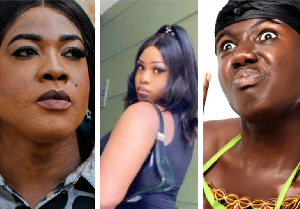 Ghanaian male socialites, Angel Maxine, Ohemartin and Akonoba
Ghanaian male socialites, Angel Maxine, Ohemartin and Akonoba
In recent times, social media in this part of the world has witnessed a growing trend of cross-dressers; persons who wear clothes traditionally associated with a different gender.
A number of popular male content creators, particularly skit makers, have been spotted online lately, putting out content dressed in female clothing.
In some African countries like Nigeria and Kenya, some well-known cross-dressers have faced severe consequences, including incarceration and even murder.
This has raised questions about Ghana's legal stance on cross-dressing, aside from the fact that societal norms generally frown upon it.
What are the legalities surrounding cross-dressing in Ghana?
According to Section 10 of the Human Sexual Rights and Family Values Bill of 2021, anyone in Ghana who cross-dresses or dresses as the opposite gender could face imprisonment.
However, the law has not yet been enacted, as the president has not yet assented to the bill.
Therefore, no arrests can be made at the moment, and the police cannot act until the bill is passed.
Cultural twist
Cross-dressing is not explicitly illegal, but it may be subject to societal and cultural norms that disapprove of it.
Cross-dressing and the LGBT+ tag
Cross-dressing itself is not directly linked to the LGBT+ community; however, it is a fact that many cross-dressers identify as queer.
Nevertheless, it is not accurate to categorise all cross-dressers as part of the LGBT+ community.
Meanwhile, GhanaWeb is set to premiere a documentary on playwright Uncle Ebo Whyte on Monday, August 19, 2024. Watch the trailer below:
EB/OGB